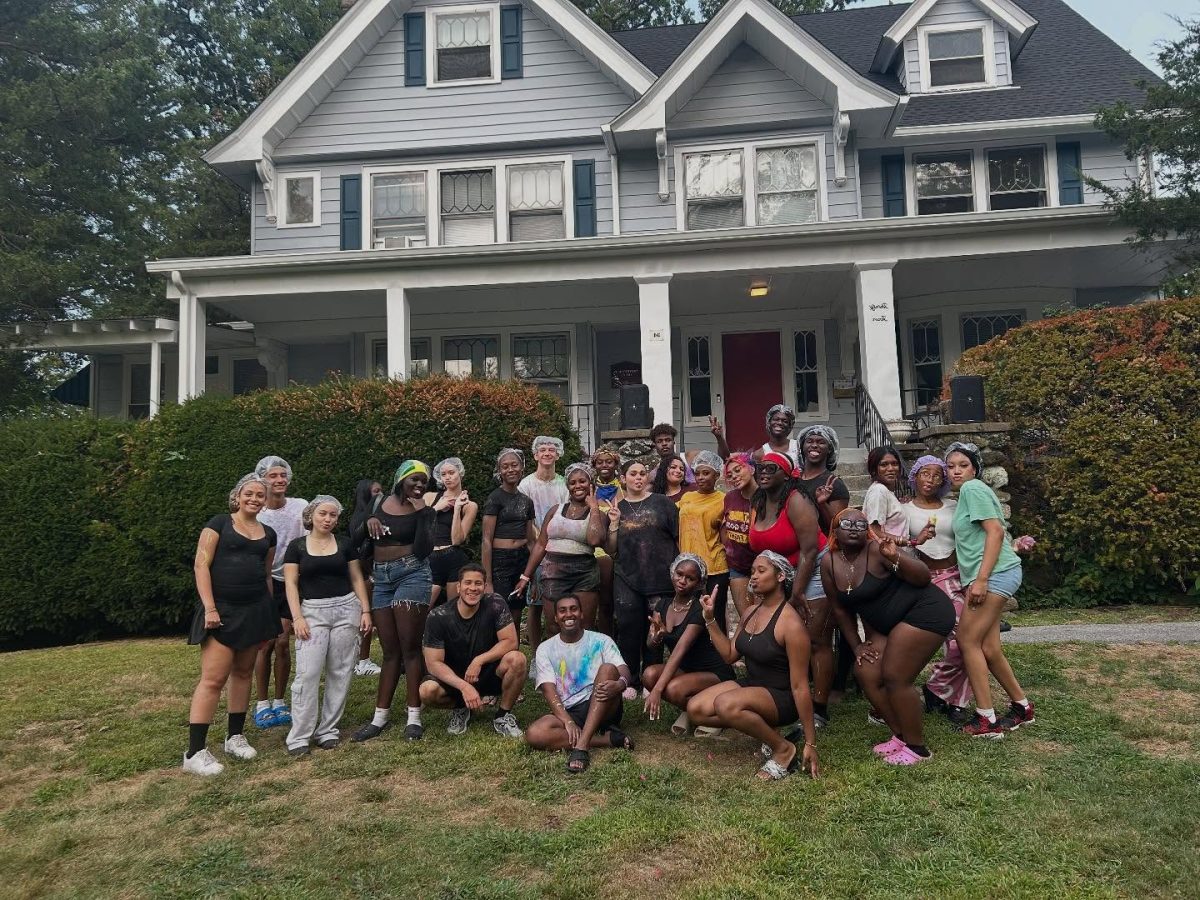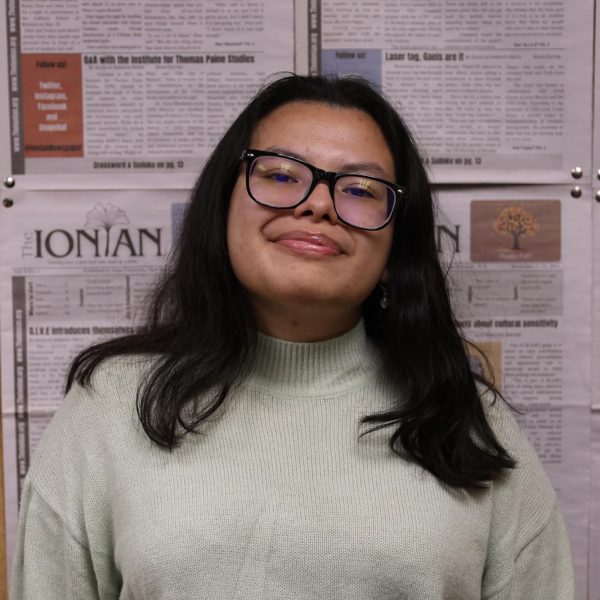Founded in 2011, the Institute for Thomas Paine Studies, ITPS, intends to facilitate the study of Paine and supports the wider interdisciplinary research in American history, particularly the revolutionary and early national periods. While he is most remembered for writing “Common Sense,” the founding father’s legacy goes beyond his seminal work. Along with writing “Rights of Man” and “The Age of Reason,” Paine is revered for his contributions to the development of the United States and political thought.
Dr. Nora Slonimsky is the ITPS Director and Gardiner Associate Professor of History. She has taught courses on the history of early America, digital humanities and the development of media, politics and intellectual property. Her research interests include political economy, legal history, communication and book history in the eighteenth century anglophone world. Dr. Slonimsky also oversees the Thomas Paine Studies minor. Recently, Dr. Slonimsky appeared on C-SPAN to discuss “Common Sense” as part of the series “Books That Shaped America.”
Dr. Michael Crowder is the Public Historian for the ITPS. He earned his doctoral degree from the History Department at the Graduate Center, City University of New York. Dr. Crowder serves as an archival fellow and teaches American History at Queens College, CUNY.
JA: Can you explain the history of the ITPS and how the institute came to be? As well as ITPS’s association with Iona University?
NS: The ITPS was founded in 2011. Thomas Paine lived the last years of his life in New Rochelle, New York. He lived around eight or nine years on a farm, in what is now a cottage, but was a larger farm down the road from Iona. So, the connection between Iona, Paine and the New Rochelle community was what promoted the ITPS to be founded. The initial goal of the institute was to preserve and study the life and legacy of Thomas Paine and his relevance to today. Since the institute’s founding, we have expanded those goals out to consider the modern-day stakes he might have been interested in, which largely revolves public history and digital humanities. You can say our three primary focuses are preserving, creating access and interest in a really cool archival collection here at Iona, which is the Thomas Paine National Historical Association. It is a unique collection, it has items from Paine’s life like his writing kit, his glasses, and a lot of hate mail that he got in different forms. We have hate mail on a picture, on coins, political cartoons, maps and things like that. We also have an intuitional collection, the Thomas Paine Historical Association. It was a historical association that continues to this day, but it was also a political activist group, so we have a lot of the records from their work from the late 19th and 20th century of how Paine inspired them around radical politics. As a sidenote, one of those people involved in the organization was one of the first professional photographers, so we have the photo plates for Mark Twain on his deathbed, images of Thomas Edison and photos of the first professional woman swimmer. That is our first big focus, our other work is public history and digital humanities that create opportunities for students, scholarships and community engagement.
JA: How can students get involved with the ITPS?
MC: There are a couple of different ways. We have a new public history and digital humanities minor degree program. Public history being the various ways historical knowledge is transferred into public audiences through statues, for example, or through museum exhibits. As part of the minor degree program, we train students not only to think of how historical knowledge is transferred to the public but to develop careers especially for students who are interested in not just in history of Thomas Paine or the American Revolution but broadly. As well as digital humanities, in which we take digital tools as they develop rapidly in a similar way to public history in a way to melt public history and digital humanities together. As part of the minor degree program, we have had internship opportunities for students since 2019. We have a number of internship opportunities with different organizations. In Mount Vernon, Virgina, we have really cool programs where we ask students to work on projects like the colonial music institute, a mass collection of music manuscripts from the 18th and 19th centuries as part of creating a new massive database, which is a years long process. We are developing one in the spring, hopefully, with Westchester Historical Society. We have connections as well with the Holocaust Muesum, which is in lower Manhattan. We are always developing internship opportunities for students as part of the curriculum of the digital humanities minor degree. There are also opportunities with the ITPS. We have a student named Charles, who has been making TikTok videos in the archive. We are trying to develop ways to get students interested in public history and digital humanities like event planning, not just making TikToks. We also have internships for credit and limited, paid internships. There are lots of different ways for students who are interested in history and maybe do want to be a historian, minoring in history or have other interests to get involved.
NS: We provide internship opportunities, both paid and for credit. We offer an exciting degree program in public history and digital humanities and through that program, we form a lot of connections with future employers and other intellectual creative opportunities. We also try to offer community engagement, giving students experience and meeting people through our different events and different incentives. We are a partner with the McNeil Center for American Studies with the University of Pennsylvania. Every year, the ITPS sends a senior to a semester long program in Philadelphia. A student visits Philadelphia twice as part of the program, where you develop a scholarly product. This can be a digital humanities project or a traditional research paper that you workshop with other McNeil scholars around the country.
JA: My final question is what do you find interesting about Thomas Paine?
MC: As Dr. Slonimsky mentioned, Thomas Paine received a lot of hate mail. He was a very controversial figure in his time and continues to be for historians. I am writing a sort of new biography of him, but to me what I find most interesting is looking at the founding generation, the people who participated in the founding at least in the political process in the American independence movement, people he knew like Thomas Jefferson, John Adams, Benjamin Franklin, I think it is fair to say that a lot of his ideas were radical for the time. He was anti-slavery to begin with, he believed that slavery was morally wrong as it allowed some people to own other human beings as articles of property and it is a poor way to organize a society. A few men of his generation, specifically white men, who had roles in the unfolding of the independence movement articulated ideas against women’s subordination. I consider him an early proponent for women rights. He was interested against class and social structures like monarchy and aristocracy because he believed in what we today call democracy. He was a believer in democratic political participation, in particular the idea that monarchs and hereditary aristocracy had historically used their power to oppress a much larger number of people unfairly. That was connected to him with anti-slavery and connected to his views on women’s subordination. I think although progressive is not a word they would have used in his lifetime, Paine would have been one of the most progressive of the founding generation. I think it would be a fair way to characterize him.
NS: I think this is a bit of a personal response. Over the years, one of the things I have caught onto appreciating Paine as an individual and as a thinker is what a skillful communicator he was. Not to imply that he was not an original or a deep philosopher as complex as his peers, but the way he was able to take concepts that I think were reserved for rich people or elites, people who had more time to read and participate, to make it accessible for everyone. It is something I really admire in our current moment, where a lot of educational institutions are having a really hard time with funding and other kinds of things. I think his focus on knowledge and learning being for everyone is really important as a teacher myself is something over time I really admire and take it more to heart.
On Oct. 24 from 6 to 7:30 p.m., ITPS will host “American Revolution(s) in World and Action: A Conversation” with David Waldstreicher and Benjamin Carp. The Q&A will be moderated by Dr. Crowder and discuss the intersections between the authors’ recent work “The Odyssey of Phillis Wheatley” and “The Great New York Fire of 1776.” The event will be held on campus in Ryan Library and on Zoom.
For more information and upcoming events from the ITPS, you can visit the research portal. The ITPS also hosts the podcast “Public History in a Virtual Age” as well as hosting a newsletter “Page of Reason” on Substack.



